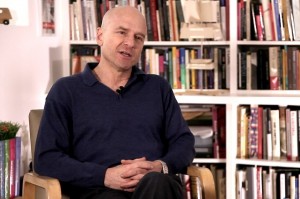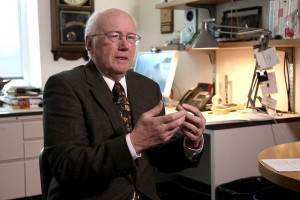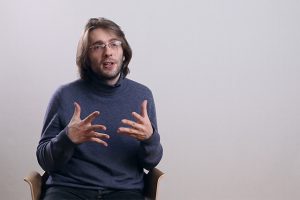Digital Humanities
Harvard Professor Jeffrey Schnapp on print as a tremendously powerful medium, dynamic media forms, and the Wor...
What are the peculiarities of teaching mathematics through MOOCs? How will online courses develop? What is the history of online courses? These and other questions are answered by MathWorks Professor of Mathematics at MIT Gilbert Strang.
My first class is about linear algebra, which means matrices. So a vector, a matrix, understanding the inverse of a matrix, the eigenvalues of a matrix, the eigenvectors a matrix — all about matrices. It’s a normal undergraduate course. It can be pure mathematics; it becomes a kind of learning experience for how to do simple pure mathematics before the difficult part. But also for more people it’s a useful thing, because linear equations are what computers can solve. So it’s very, very important. More people use matrix theory than calculus.
The website for the new courses can give homework. You submit the solution electronically, the homeworks are graded electronically now, because maybe a hundred thousand students are taking the course all over the world. It’s bringing a big change, or it started a big change in education and it’s a change we don’t know where it’s going. It’s too new to say what’s happening. And if you take examinations and do homework, then there should be a system to give credit for — “Yes, I took that course, I did the work, I can go on to our next course.” A university will say: “Yes, you understood that”, because I’ve taking examination to show that it’s understood.
It allows people to take a course in the evening. If they’re working, they don’t have to be at a university. And they may be simply interested in the subject. It’s wonderful, how many people want to learn about science and mathematics. It’s super to think that it can be seen not just by a class of 100 at MIT, but by a class of one million. So that’s where it’s going, there are many, many questions about it, because it’s not very personal. A student has questions, but the student is not together with the professor. And that’s an important thing, which is lost. But so we have some gains — the lower-cost, the wider distribution and we have some losses of personal interaction

Harvard Professor Jeffrey Schnapp on print as a tremendously powerful medium, dynamic media forms, and the Wor...

MIT Senior Research Scientist David Clark on contention in communication industry, alternative to the Internet...

Philosopher Dennis Bonnay on logical pluralism, the liar's paradox, and reflective equilibrium